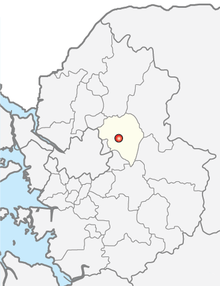The Namyangju massacre (Korean: 남양주 민간인학살,[1][2] Hanja: 南楊州民間人虐殺[1][2] Namyangju civilian massacre[1][2]) was a mass killing conducted by South Korean police and local militia forces between October 1950 and early 1951 in Namyangju, Gyeonggi-do district of South Korea. More than 460 people were summarily executed, including at least 23 children under the age of 10.[4][1][2] After the victory of the Second Battle of Seoul, South Korean authorities arrested and summarily executed several individuals along with their families on suspicion of sympathizing with North Korea.[5] During the massacre, South Korean Police conducted the Goyang Geumjeong Cave massacre in Goyang near Namyangju.[6][7]
| Namyangju massacre | |
|---|---|
| Part of the Korean War | |
| Location | Namyangju, Gyeonggi-do, South Korea |
| Date | October 1950[1][2][3] – early 1951[4] |
| Target | Suspected leftists and their families[4] |
Attack type | Massacre |
| Deaths | over 460[4] |
| Perpetrators | South Korean Police and local militia[4][1] |

On 22 May 2008, the Truth and Reconciliation Commission demanded that the South Korean government apologize for the massacre and support a memorial service for the victims.[1][3]
See also
editReferences
edit- ^ a b c d e f g Kim Sung-hwan (2008-05-22). "남양주 민간인학살 국가사과 권고". Hankyoreh. Retrieved 2012-08-30.
- ^ a b c d e "진실화해위, 남양주 민간인학살 국가사과 권고". 경기북부일보. 2008-05-29. Retrieved 2012-08-30.[permanent dead link]
- ^ a b "남양주 집단학살 58년만에 규명". 경인일보. 2008-05-23. Retrieved 2012-08-30.
- ^ a b c d e Charles J. Hanley and Jae-Soon Chang (Dec 6, 2008). "Children 'executed' in 1950 South Korean killings". San Diego Union-Tribune. Associated Press. Retrieved 2012-08-30.
- ^ "'고양 금정굴 민간인 학살사건' 유족에게 1억원 국가 배상 판결 "헌법에 보장된 기본권인 신체의 자유와 적법절차에 따라 재판받을 권리 등 침해"". CBS. 2011-11-28. Retrieved 2012-08-30.
- ^ "Goyang Geumjeong Cave Massacre memorial service". Hankyoreh. Feb 9, 2010. Retrieved 2012-08-30.
- ^ Charles J. Hanley (December 6, 2008). "Children 'executed' in 1950 South Korean killings". San Diego Union-Tribune. Associated Press. Retrieved 2012-08-30.
External links
edit- Truth and Reconciliation Activities of the Past Three Years Truth and Reconciliation Commission, Republic of Korea
